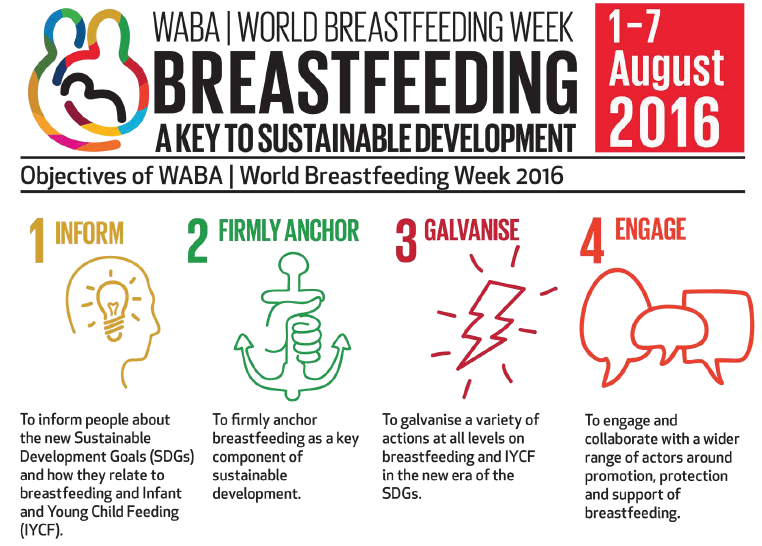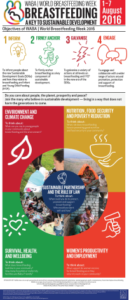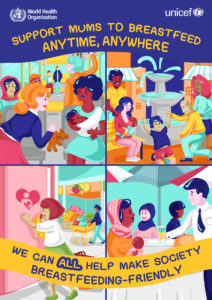World Breastfeeding Week – ‘Breastfeeding: A key to Sustainable Development’
From 1st to 7th August every year, World Alliance for Breastfeeding Action (WABA) coordinates World Breastfeeding Week (WBW) to encourage breastfeeding and improve the health of babies around the world. WBW is celebrated in over 176 countries. Breastfeeding is a critical first step on…
From 1st to 7th August every year, World Alliance for Breastfeeding Action (WABA) coordinates World Breastfeeding Week (WBW) to encourage breastfeeding and improve the health of babies around the world. WBW is celebrated in over 176 countries.
Breastfeeding is a critical first step on a child’s path to a healthy future. Early and exclusive breastfeeding helps children survive, but it also supports healthy brain development, improves cognitive performance and is associated with better educational achievement at age 5. Breastfeeding is also a critical element of worldwide development efforts to create a more healthy, prosperous and sustainable planet. Yet, less than half of the world’s newborns benefit from early breastfeeding and even fewer are exclusively breastfed for the first six months. For working women in all contexts, breastfeeding remains a challenge.
This year’s World Breastfeeding Week focuses on the way that Breastfeeding will accelerate progress towards the 17 Sustainable Development Goals (SDGs) that governments around the world have agreed to achieve by 2030. WBW will cover 5 broad themes: 1) nutrition and food security, 2) health, well-being and survival, 3) environment and climate change, 4) work productivity, empowerment, social protection, and 5) sustainable partnerships and rule of law.
Breastfeeding in SUN Countries at a Glance
44 SUN Countries have in place some form of legal measure related to the International Code of Marketing of Breast-Milk Substitutes (‘the Code’) and subsequent, relevant resolutions adopted by the World Health Assembly.
Out of which, 20 SUN Countries[1] have comprehensive legislations or regulations reflecting all or most provisions of the Code.
As a landmark move, Botswana has adopted a new law that goes beyond the minimum standard set by the Code by introducing many innovative provisions with robust monitoring procedures. The scope of the law covers all foods for infants and young children up to three years of age and prohibits a wide range of inappropriate marketing practices. Proactive action by the Ministry of Health has proven to be essential in the implementation of the Code with the issuance of public statements about the impact of inappropriate marketing on the health of infants and young children and the intention to enforce the law.
Vietnam recently reviewed its implementation of the Code and built a coalition of government, multilateral agencies and NGO partners to address the weakness in existing regulations. Following the recommendations of the coalition, the government approved a new decree with provisions for marketing and use of nutritious products and materials for infants. The coalition also successfully advocated for expanding paid maternity leave from four to six months and for implementing a total ban on the promotion of breast-milk substitutes for children up to two years old.
For the first time ever, the Parliament of Kenya approved a bill which mandates companies to provide a conducive environment for working mothers by setting aside special breastfeeding areas for employees with children. Under the provision, stations are required to be equipped with all necessary facilities, including electric outlets for breast pumps, refrigerators and appropriate cooling facilities within office premises. Employers are also obliged to provide comfortable seats for mothers to ensure the breastfeeding experience is as relaxed as possible.
To strengthen the enforcement of existing regulations on infant feeding, Peru endorsed a Multisectoral Strategic Plan for the Promotion and Protection of Breastfeeding 2013-2021, ensuring that workplaces have breastfeeding rooms, and re-assessing hospitals that have previously been certified as “mother- and baby-friendly” to confirm that they still support breastfeeding. Last year, a ministerial resolution approved and adopted a guide to help establish counselling to support and facilitate the right of mothers to breastfeed their children.
[1] Legal Status of the Code as reported in the 2016 Report on Marketing of breast-milk substitutes: National implementation of the international code http://www.who.int/nutrition/publications/infantfeeding/code_report2016/en/
Get Involved
Breastfeeding is not just a one woman job – Support #WBW2016 !
Join the social media movement now to support women – especially working women – who breastfeed!
- Follow @WABAsecretariat on Twitter and Facebook, and use relevant hashtags (#WBW2016 #breastfeeding #SDGs #WABA #WBWGoals #GlobalGoals) to stay up-to-date.Download WBW 2016 Resources
- Download #WBW2016 Resources
- Download WHO infographics for the WBW2016
Find out more about breastfeeding :
- The Lancet Breastfeeding Series
- Marketing of Breast-Milk Substitutes Report
- Save the children Report on Superfood for babies



